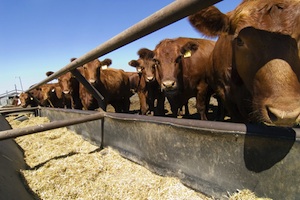NOBULL: Study shows beta-agonist Zilmax use increases cattle deaths
Study shows beta-agonist use increases cattle deaths (updated)
File photo
By Rita Jane Gabbett on 3/13/2014
Even though cattle feedlot deaths are rare, beta-agonists (βAA) including zilpaterol and ractopamine fed to cattle to improved growth and increase muscle mass appear to increase deaths in feedlots, according to a new research report authored by Guy Loneragan, Daniel Thomson and H. Morgan Scott.
The research was prompted by controversy around the use of the zilpaterol brand Zilmax, which was removed from the market last year by maker Merck Animal Health after first Tyson Foods, then others including Cargill, stopped accepting cattle fed the growth promotant.
In a research paper titled “Increased Mortality in Groups of Cattle Administered the β-Adrenergic Agonists Ractopamine Hydrochloride and Zilpaterol Hydrochloride,” the authors outlined how they arrived at those conclusions.
Using three data sets that included clinical trials and observational data, the researchers found consistently across datasets and models that the cumulative risk and incidence rate of death was 75 percent to 90 percent greater in animals administered the beta-agonists compared to contemporaneous controls. During the exposure period, 40 percent to 50 percent of deaths among groups administered the beta-agonists were attributed to administration of the drug.
“Only month of slaughter, presumably a proxy for climate, consistently modified the effect in that the biological association was generally greatest during the warmer months of the year,” the researchers wrote. “While death is a rare event in feedlot cattle, the data reported herein provide compelling evidence that mortality is nevertheless increased in response to administration of FDA-approved βAA and represents a heretofore unquantified adverse drug event.”
Merck response
Merck issued the following statement, questioning the validity of the research:
The health and well-being of animals is the first and foremost priority of Merck Animal Health. We believe in the science that supports Zilmax, which is approved by FDA and international regulatory authorities, and are confident in its safety and performance.
Only a well-designed clinical study, in a real world setting coupled with analysis of data by third-party industry experts, can thoroughly confirm the safety profile and performance of a product. In more than 30 studies, totaling 65,000 head of cattle, conducted by well-respected universities and third-party experts using sound scientific principles, no increase in death loss for cattle fed Zilmax compared to controls was observed. The results from Zilmax studies have been published in well-respected, peer-reviewed publications such as the Journal of Animal Science, The Professional Animal Scientist and Meat Science.
In contrast, Dr. Loneragan’s opinions are based on observational information and we disagree with them. Using observational analyses where cattle are not randomized and where rigorous scientific procedures are not utilized, is not a respected scientific method to rigorously evaluate the safety and efficacy of any product. For these reasons, caution should be used in drawing conclusions from analyses such as those conducted by Dr. Loneragan. To be scientifically rigorous, researchers must randomize and replicate groups of cattle that allow for the creation of control and treatment groups.
In addition to the 30 plus randomized, controlled studies conducted to date, Merck Animal Health is also conducting an extensive field evaluation program that is being conducted by independent experts as part of our five-step plan. This program will add to the significant amount of data that already exists for Zilmax and will support the results of previous studies and the safety of the product.
As we noted in a previous statement to Reuters, we take any adverse event report very seriously and investigate each one thoroughly, often utilizing independent experts to provide additional support, knowledge and expertise. We do this whether or not it appears that particular Merck Animal Health product is involved. We are committed to adhering to all regulatory guidelines.
